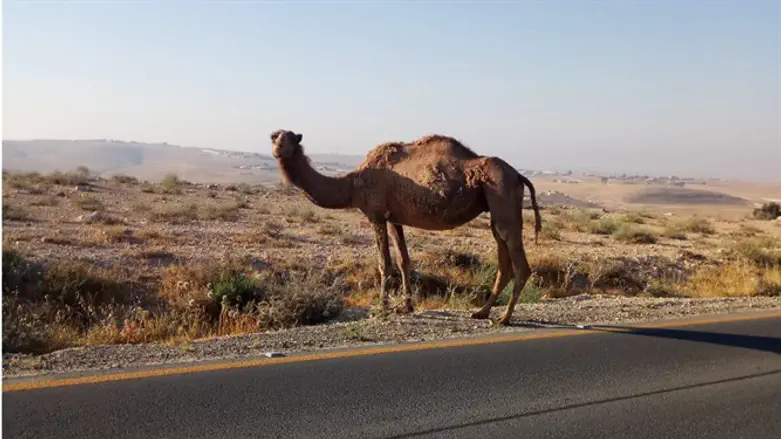
One of the most beautiful roads between the communities of Mount Hevron and Shoket Junction is Route 316 via the Yatir Forest.
The road was opened last year and serves hundreds of vehicles belonging to the residents of Mount Hevron and the surrounding area, and shortens their way to Beer Sheva and Highway 6.
Despite the many advantages of the road, there is a significant threat to the lives of the drivers and passengers: along the road are camel pens and herds crossing the road unhindered.
Until now, many drivers have testified that they encounter camels on an almost daily basis and manage to slow the car as soon as they see a camel to prevent an accident, but on parts of the road where there is no light at night, the ability of advance identification is put in jeopardy and the danger increases.
The consequences of road accidents with camels are heavy. At the beginning of the year, 13-year-old Yael Elmakayes was killed on Route 40 from a camel accident. In all, over the past ten years, 15 people have been killed and hundreds injured in road accidents involving camels.
"I drive on Route 316 a few times a week, sometimes every day," says a resident of Hiran (Mahane Yatir). "When I see a camel I try to push it away myself and then call the police, and I often get a response from the dispatchers, 'What do you want me to do? Fine the camels?’ but later get a notification that the issue was dealt with.”
“I believe that a police car really comes, but it will not help to merely keep the camel away for that moment because it will come back. Serious enforcement is required here before it is too late. "
About a month ago, the Knesset passed the “Animal Marking and Control Law,” whereby camels will be marked with a subcutaneous chip that will identify their owners after accidents, such that a person registered as the owner of the camel will bear criminal liability for negligence in supervision of the camel.
The purpose of the marking is to make camel owners manage their flocks and take responsibility for wandering camels. It seems, however, that the passage of the law does not stop camels from roaming along Negev roads, and people continue to face the threat of accidents even now.
After repeated requests from the residents and the Mount Hevron Regional Council, enforcement activities were initiated by Border Police and the “Green Patrol” from the Nature and Parks Authority which includes the distribution of warnings to camel owners and their confiscation, if necessary.
The head of the council, Yochai Damari, called for "the imposition of all the weight and enforcement of the law, including fines and the confiscation of flocks in order to protect the lives of residents and passengers.”
"I thank the forces currently operating in the area, albeit belatedly. In this case, the writing is on the wall, and if the legal elements do not act systematically and over time we will not be able to absolve ourselves of responsibility in the event of a disaster, Heaven forbid," he warned.